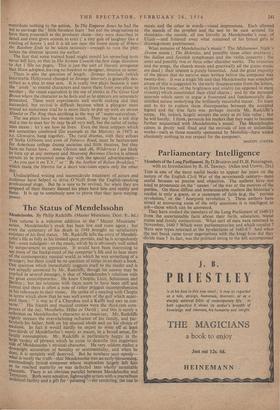The Status of Mendelssohn
Mendelssolin. By Philip Radcliffe. (Master Musicians. Dent. 83. 6d.)
THIS volume is a welcome addition to the Master Musicians ' series. Mendelssohn's stock has been low and risen again ; but even the centenary of his death in 1949 brought no satisfactory estimate of his final status. Mr. Radcliffe tells the story of Mendels- sohn's life as fully as his limited space permits, and he is scrupulously fair--even indulgent—to the music, which he is obviously well suited by temperament to appreciate. It would have been interesting to see more of the background of the composer's life and to hear more of the contemporary musical world, in which he was something of a stranger; but there could be no question of either in so short a book. One question which immediately suggests itself to the reader and is not actually answered by Mr. Radcliffe, though his answer may be Implied in several passages, is that of Mendelssohn's relations with his great contemporaries. He knew Chopin, Liszt, Schumann and Berlioz ; but his relations with them seem to have been stiff and formal and there is often a note of rather priggish incomprehension In his references to their music. He spoke of a meeting with Chopin in terms which show that he was well aware of the gulf which separ- ated them : " it was as if a Cherokee and a Kaffir had met to con- verse." His friends and musical cronies were the third-rate com- Posers of the day, Moscheles. Hiller or David ; and this is surely a reflection on Mendelssohn's character as a musician. Mr. Radcliffe tightly stresses the overwhelming influence of his family, and par- ticularly his father, both on his musical ideals and on his choice of medium. In fact it would hardly be unjust to write off at least two-thirds of Mendelssohn's music as meant, in a broad sense, for family consumption. Mr. Radcliffe is particularly happy in the large variety of phrases which he coins to describe this important side of Mendelssohn's musical character. He very seldom makes a downright accusation of banality or sentimentality, and when he does, it is certainly well deserved. But he nowhere says openly— What is surely the truth—that Mendelssohn was an early-blossoming, outstandingly lyrical composer whose inspiration largely left him as he reached maturity or was deflected into wholly unsuitable camels. There is an obvious parallel between Mendelssohn and Tennyson. Both were sensitive, lightweight artists with a marvellous technical facility and a gift for painting '--for rendering, the one in
music and the other in words—visual impressions. Each allowed the mantle of the prophet and the seer to be cast around his shoulders—the mantle, all too literally in Mendelssohn's case, of Elijah—and frittered away what remained of his lyrical gifts in drawing-room prettinesses.
What remains of Mendelssohn's music ? The Midsitnitner Night's Dream music ; The Hebrides', and possibly three other overtures ; the Italian and Scottish symphonies and the violin concerto ; the octet and possibly two or three other chamber works. The oratorios and the songs, the church music and practically all the piano music are dead ; their interest is purely historical. And the great majority of the pieces that do survive were written before the composer was twenty-five. It was a tragic life and that Mendelssohn was somehow aware of this is suggested by the early disappearance from the letters, as from his music, of the brightness and vitality (as opposed to mere, vivacity) which constituted their chief charm ; and by the personal quarrels which seem to argue a frustrated and fundamentally dis- satisfied nature underlying the brilliantly successful career. To trace and to try to explain these discrepancies between the accepted legend and the true facts was perhaps outside Mr. Radcliffe's scope. He, indeed, largely accepts the story at its face value ; but he will hardly, I think, persuade his readers that they want to become further acquainted with Mendelssohn's music. The Mendelssohn canon is pretty well fixed and the revivals of lost or unfamiliar works—such as those recently sponsored by Menuhin—have added absolutely nothing to our respect for the composer.
MARTIN COOPER


































 Previous page
Previous page